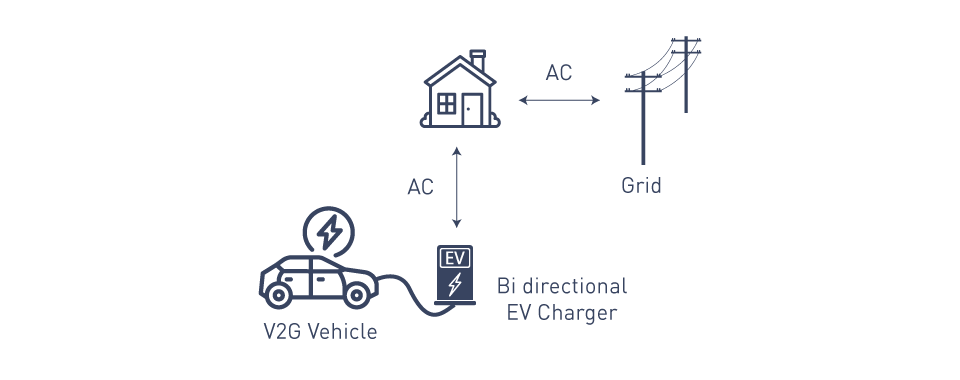Exploration of Potential Future Trends in AC Power Technologies
The growing need for resilience, sustainability, and energy efficiency is propelling the rapid evolution of AC power systems. The future of AC power systems is anticipated to be shaped by a number of major themes that represent developments in policy, technology, and market factors.
Decentralization of Power Generation: There will probably be a big move toward decentralization in AC power systems in the future. Local energy production and supply will be greatly aided by distributed energy resources (DERs), which include community-based microgrids, rooftop solar panels, and tiny wind turbines. Energy independence and resilience will increase as a result of this trend's decreased reliance on centralized power plants and transmission networks.
Integration of Renewable Energy at Scale: The incorporation of large-scale renewable energy sources into AC power systems is going to become more and more crucial as the world moves toward a low-carbon economy. Developments in grid management technology, energy storage systems, and power electronics will enable the seamless integration of solar, wind, and hydroelectric electricity. This will assist to stabilize the grid and guarantee a steady supply of sustainable energy.
Enhanced Grid Intelligence and Automation: As the smart grid revolution progresses, more focus will be placed on automation and grid intelligence. More effective grid management, predictive maintenance, and fault detection will be made possible by the use of sophisticated sensors, real-time data analytics, and artificial intelligence (AI). Power systems will be more resilient and reliable because of self-healing grid capabilities and automated demand response (ADR).
Electric Vehicles (EVs) and Grid Interaction: The widespread use of EVs poses opportunities as well as concerns for AC power networks. In order to balance supply and demand, future trends will concentrate on integrating EVs as dynamic grid resources through the use of vehicle-to-grid (V2G) technologies. When demand is at its highest, EVs can function as mobile energy storage devices, offering auxiliary services and bolstering system stability.

Figure 9: Vehicle-to-grid – V2G
Advanced Energy Storage Solutions: In order to overcome the intermittent nature of renewable energy sources, energy storage technologies will keep developing. The efficiency and capacity of energy storage systems will be improved by advancements in battery technology, including flow and solid-state batteries, as well as by the use of flywheels and compressed air for alternate energy storage. Improved grid stabilization, peak shaving, and load leveling will be made possible by these developments.
Ongoing Research Areas and Emerging Fields
The ever-changing field of AC power technology demands ongoing research and development in order to meet new obstacles and seize fresh chances. Future developments in the subject are expected to be driven by a number of important research topics and developing fields.
Power Electronics and Semiconductor Devices: The goal of power electronics and semiconductor device research is to create components that are more economical, dependable, and efficient. Silicon carbide (SiC) and gallium nitride (GaN) are leading examples of wide bandgap (WBG) semiconductors, providing greater performance in terms of voltage handling, switching speed, and thermal management. These developments will result in smaller and more effective inverters, converters, and other power electronic equipment.
Microgrid and Nanogrid Technologies: These two technologies are becoming essential parts of the energy systems of the future. The goal of the research is to optimize their interface with the main grid, as well as their design and functionality. This entails creating sophisticated control algorithms, improving interoperability, and investigating fresh venture ideas for the implementation of microgrids. Microgrids have notable advantages for resilience, energy security, and local grid management.
Artificial Intelligence and Machine Learning Applications: These two technologies are revolutionizing the administration and operation of electricity systems. Utilizing these technologies for demand forecasting, fault diagnosis, energy optimization, and predictive maintenance is the subject of ongoing study. AI-driven decision-making procedures will raise power systems' overall efficiency, lower operating costs, and increase grid resilience.
Cybersecurity and Grid Resilience: As electrical systems get more digitally integrated and networked, it is critical to guarantee grid resilience and cybersecurity. The development of strong security frameworks, real-time threat detection, and response mechanisms are the main areas of research in this field. To keep a steady and secure supply of electricity, power networks must be made more resilient to interruptions like natural disasters and cyberattacks.
Advanced Materials for Energy Applications: One important field of study is the creation of novel materials with improved mechanical, thermal, and electrical characteristics. Materials for highly efficient solar cells, thin conductors, and cutting-edge insulation fall under this category. These components will improve the power generation, transmission, and distribution systems' longevity, sustainability, and efficiency.


直接登录
创建新帐号